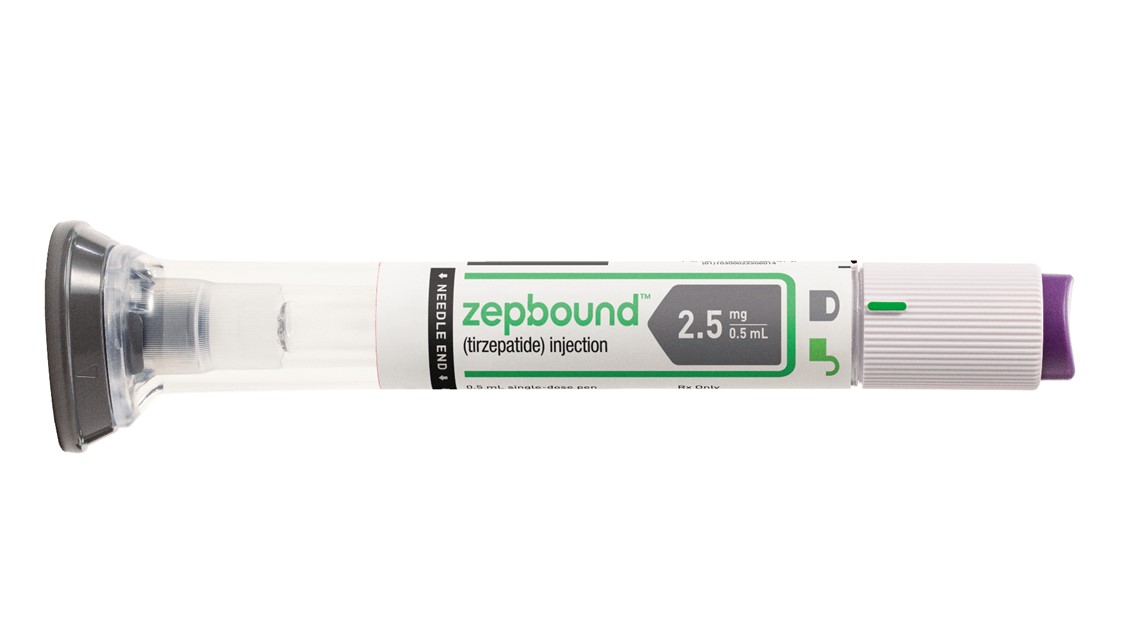INDIANAPOLIS — Eli Lilly is releasing single-dose vials of weight loss drug Zepbound that will help adults living with obesity.
Zepbound 2.5 mg and 5 mg single-dose vials are available for patients with a prescription. A four-week supply of the 2.5 mg single-dose is $399 ($99.75 per vial), and a four-week supply of the 5 mg dose is $549 ($137.25 per vial). Zepbound is also available in doses of 7.5 mg, 10 mg, 12.5 mg and 15 mg.
Health officials said the recommended "maintenance dosages" are 5 mg, 10 mg or 15 mg injected under the skin of your stomach, thigh or upper arm once a week at any time of day. Doctors recommend you change or rotate your injection site with each weekly injection, and to never use the same site for each injection.
According to Eli Lilly, the single-dose vials are priced at a 50% or greater discount compared to the list price of all other incretin medicines for obesity.
Health officials said this new option helps millions of adults with obesity access the medicine they need, including those without employer coverage and those who need to self-pay outside of insurance.
Eli Lilly said they have created a new self-pay pharmacy component of LillyDirect where patients with a prescription can purchase the vials.
RELATED: Mounjaro, Zepbound pour money into Eli Lilly, fueling a better-than-expected second quarter
"Distributing the vials via this channel ensures patients and providers can trust they are receiving genuine Lilly medicine, building on the company's efforts to help protect the public from the dangers posed by the proliferation of counterfeit, fake, unsafe or untested knock-offs of Lilly's medications," the company said in a news release. "Lilly has also taken a vocal stance against the use of obesity medicine for cosmetic weight loss; a multi-step verification process will help ensure the vials are dispensed only to patients who have a valid, on-label electronic prescription from their health care provider."


Patients will also be able to purchase syringes and needles, and will have access to instructional materials on how to properly administer the medicine.
"We are excited to share that the Zepbound single-dose vials are now here, further delivering on our promise to increase supply of Zepbound in the U.S.," said Patrik Jonsson, executive vice president, and president of Lilly Cardiometabolic Health and Lilly USA. "These new vials not only help us meet the high demand for our obesity medicine, but also broaden access for patients seeking a safe and effective treatment option. In a clinical study, the 5 mg maintenance dose helped patients achieve an average of 15% weight loss after 72 weeks of treatment and has been a powerful tool for millions of people with obesity looking to lose weight and keep it off."
If you’re interested in possibly taking this drug to aid in weight loss, here’s some additional details:
Who should take Zepbound?
Zepbound injections will be available for chronic weight management in adults with obesity, which is defined by the FDA as adults with a body mass index of 30 kilograms per square meter or greater.
It will also be available for people who are overweight, with a body mass index of 27 kilograms or greater and have at least one weight-related condition, like high blood pressure or type 2 diabetes.
Tirepatide is the active ingredient in Zepbound. It is already approved under the trade name Mounajaro and is to be used alongside diet and exercise to help improve blood sugar, or glucose, in adults with type 2 diabetes mellitus.
Both Ozempic and Zepbound, are injectable. But while Ozempic was created to help people with Type 2 diabetes specifically, Zepbound is for weight management making it similar to Wegovy.
How was the FDA approval made?
The FDA approval was made following final results from a clinic trial. A study of 2,539 adults with obesity, or excess weight and weight related medical problems not including diabetes. People involved in the trial who took Zepbound alongside a healthy diet and exercise lost “a substantial amount of weight” compared to a placebo group at 72 weeks, according to the FDA.
At 15 mg, the highest dose, participants taking Zepbound lost 48 pounds on average, while people lost an average of 34 pounds on the lowest 5 mg dose. Placebo participants lost 7 pounds.
The trial found 1 in 3 patients who took Zepbound at the highest dose lost over 58 pounds, or about 25% of their body weight. The placebo group lost 1.5% of their body weight.
The average starting weight for clinical trial participants was 231 pounds.
RELATED: WHO and Eli Lilly caution patients against falling for fake versions of popular weight-loss drugs
Is this similar to Ozempic or other drugs?
While Zepbound and Ozempic are used for different purposes, they are part of the same family called GLP-1 agonists.
GLP-1 agonists work by mimicking the action of a hormone called glucagon-like peptide 1.
When blood sugar levels start to rise after someone eats, these drugs stimulate the body to produce more insulin. The extra insulin helps lower blood sugar levels and also makes people who take it feel more full.
It contains the same active ingredient, tirzepatide, as Mounjaro which is also sold by Eli Lilly.
Diabetes drugs in the GLP-1 agonists class are generally taken by an injection given daily or weekly and include:
Dulaglutide (Trulicity) (weekly)
Exenatide extended release (Bydureon bcise) (weekly)
Exenatide (Byetta) (twice daily)
Semaglutide (Ozempic) (weekly)
Liraglutide (Victoza, Saxenda) (daily)
Lixisenatide (Adlyxin) (daily)
Semaglutide (Rybelsus) (taken by mouth once daily)
Zepbound may cause serious side effects, according to Eli Lily, including tumors in the thyroid, including thyroid cancer.
Watch for possible symptoms, such as a lump or swelling in the neck, hoarseness, trouble swallowing, or shortness of breath. Stop taking the medicine if you have any of these symptoms:
Severe stomach problems
Kidney problems (kidney failure)
Gallbladder problems
Inflammation of the pancreas (pancreatitis)
Serious allergic reaction
Low blood sugar (hypoglycemia).
Changes in vision in patients with type 2 diabetes.
Depression or thoughts of suicide.
For more information about Zepbound, click here.

